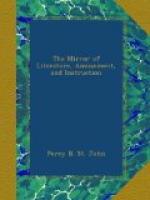Glass which ribs of iron bind;
For Time, still partial to this glass,
Made it durable as brass,
That, placed secure upon a shelf,
None might crush it but himself.
Let us here the day prolong
With loyal and with nuptial song,
Such as, with duteous strains addrest,
May gratify each royal guest;
Thrice happy, should our rural toils
Be requited by their smiles.
There are other affectionate testimonials in the grounds. The Gothic ruin contains an apartment fitted up as an oratory, ornamented with a copy of the Descent from the Cross, modelled in chalk, after the celebrated painting by Rembrandt; busts of George iii. and the Duke of Kent; a posthumous marble figure of an infant child of his present Majesty; and an alto-relievo representing an ascending spirit attended by a guardian angel with the inscription—
Monumental Tablet
To the Memory
of
Her Royal Highness the Princess Charlotte.
* * * * *
ANCIENT WAGES TO MEMBERS OF PARLIAMENT.
(For the Mirror.)
Chamberlayne, in his Angliae Notitia, says, “Although the lords of parliament are to bear their own charges, because they represent there only themselves; yet all the commons, both lay and clergy, that is, Procuratores Cleri, are to have rationales expensus, (as the words of the writ are) that is, such allowance as the king considering the prices of all things, shall judge meet to impose upon the people to pay. In the 17th of Edward II. it was ten groats for knights, and five groats for burgesses; but not long after it was four shillings for all others, which in those days, as appears by the prices of all things, was a considerable sum, above ten times more than it is now, (1688) for not only then expenses were considered, though that was great by reason of the suitable attendance that then every parliament-man had, but also their pains, their loss of time, and necessary neglect of their own private affairs for the service of their country; and when the counties, cities, and boroughs paid so dear for their expenses, they were wont to take care to chuse such men as were best able, and most diligent in the speedy despatch of affairs; by which means, with some others, more business in those times was despatched in parliament in a week, than is now perhaps in ten; so that the protections for parliament-men and their servants from arrests were not then grievous, when scarce any parliament or sessions lasted so long as one of the four terms at Westminster.
“The aforementioned expenses duly paid, did cause all the petty decayed boroughs of England to become humble suitors to the king, that they might not be obliged to send burgesses to parliament; whereby it came to pass, that divers were unburgessed, as it was in particular granted to Chipping, or Market-Morriton, upon their petition; and then the number of the Commons House being scarce half so many as at present, then debates and bills were sooner expedited.” page 156, 21st. edit.




